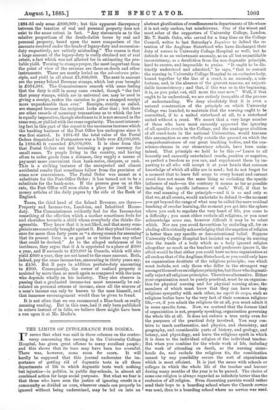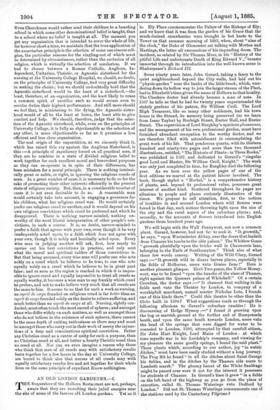THE LIMITS OF INTOLERANCE FOR DOGMA.
IT seems that what was said in these columns on the contro- versy concerning the nursing in the University College Hospital, has given great offence to many excellent people ; and this shows that its tone may have been too scornful. There was, however, some room for scorn. It will hardly be supposed that this journal underrates the im- portance of getting rid of dogmatic tests in all those departments of life in which dogmatic tests work nothing but injustice—in politics, in public day-schools, in almost all combined action for large social purposes. But what we fear is that those who have seen the justice of ignoring creeds in a community so divided as ours, wherever creeds can properly be ignored without being undermined, may be led on into an abstract glorification of creedlessnesa in departments of life where it is not only useless, but mischievous. One of the wisest and most sober of the supporters of University College, London, Mr. T. Smith Osier, who served for a long time on the College Council, writes to last Saturday's Inquirer to defend the re- tention of the Anglican Sisterhood who have discharged their duty of nurses in University College Hospital so well; but he defends it as an unfortunate anomaly, as an all but unjustifiable inconsistency, as a dereliction from the non-dogmatic principle, hard to excuse, and impossible to praise. "It ought to be dis- tinctly understood and admitted," he says, "that to commit the nursing in University College Hospital to an exclusive body, bound together by the ties of a creed, is an anomaly, a mis- fortune, and, in the absence of the gravest reasons, an unjusti- fiable inconsistency ; and that, if this was so in the beginning, it is, as you point out, still more the case now." Well, if that ought to be understood, we are entirely incapable of the process of understanding. We deny absolutely that it is even a natural construction of the principle on which University College was founded, to maintain that the nursing ought to be committed, if to a united sisterhood at all, to a sisterhood united without a creed. We assert that a very large number of those who have most earnestly approved the ignoring of all specific creeds in the College, and the analogous abolition of all creed-tests in the national Universities, would traverse this assumption as one wholly outside the ground on which the comprehensiveness of our great teaching bodies, and the con- science-clauses in our elementary schools, have been main- tained. That principle we hold to be this Leave to all honestly and earnestly entertained creeds, positive or negative, as perfect a freedom as you can, and supplement them by im- parting to all who will accept it at your hands that common knowledge of which all alike are in need ; but do not forget for a moment that to leave full scope to every honest and earnest creed does not mean the same thing as excluding the speeific influence of each—on the contrary it means as far as possible including the specific influence of each.' Well, if that be the real meaning of the principle—and it is so and only so that we, at all events, would undertake to defend it—the moment you get beyond the range of what may be called the mere residual teaching of secular learning, the moment you get into the sphere where you seek to regulate the very heart of life, you come to a difficulty ; you must either exclude all religions, or you must acknowledge some one, however difficult it may be to select which. Nor can you avoid favouritism by excluding all, for ex- cluding all is virtually acknowledging that the negation of religion is better than any specific or denominational belief. Suppose University College Hospital had insisted on putting its nursing into the hands of a body which as a body ignored religion altogether as much as the teachers and professors ignore it, the effect would be that either you could have no true organisation at all such as that of the Anglican Sisterhood, or you could only have an organisation destitute of the religious principle; one which must include, not only those who differ in the strongest way amongst themselves on religious principles, but those who dogmati- cally reject all religions principles. There is no alternative. Either your organisation must be purely practical, must be an organisa- tion for physical nursing and for physical nursing alone, tie members of which must know that they can have no deep religious sympathy with each other, no esprit de corps, such as religious bodies have by the very fact of their common religious life,—or, if you admit the religious tie at all, you must admit it in some specific form. Now, we contend that the former kind of organisation is not, properly speaking, organisation governing the whole life at all. It does not enforce a true unity even for the purposes of the practical duty involved. You may con- trive to teach mathematics, and physics, and chemistry, and geography, and considerable parts of history, and geology, and botany, and physiology, and leave the religious spirit in which it is done to the individual religion of the individual teacher. But when you -combine for the whole work of life, including the work of attenainp; on death, as the nursing sister- hoods do, and exclude the religious tie, the combination cannot by any possibility secure the sort of organisation which is most efficient. It is just the same with schools or colleges in which the whole life of the teacher and learner during many months of the year is to be passed. The choice of some one religion is always regarded as infinitely better than the exclusion of all religion. Even dissenting parents would rather send their boys to a boarding school where the Church service was used, than to a boarding school where no service was aged.
Even Churchmen would rather send their children to a boarding school in which some other denominational belief is taught, than to a school where no belief is taught at all. The moment you get any organisation that is intended to cover the whole of life, for however short a time, we maintain that the true application of the unsectarian principle is the selection of some one sincere reli- gion, the particular reasons for the singling-out of which must be determined by circumstances, rather than the exclusion of all religion, which is virtually the selection of secularism. If we had to choose between a Roman Catholic, Anglican, In- dependent, Unitarian, Theistic, or Agnostic sisterhood for the nursing at the University College Hospital, we should, no doubt, on the principles of University College, find very great difficulty in making the choice ; but we should undoubtedly hold that the Agnostic sisterhood would be the least of a sisterhood,—the least, therefore, of an organisation, and the least likely to rouse a common spirit of sacrifice such as would secure even to secular duties their highest performance. And still more should we feel that, in ministering to the dying, the Agnostic sister- hood would of all be the least at home, the least able to give comfort and help. We should, therefore, judge that the selec- tion of the Agnostic sisterhood, while, even on the principles of University College, it is fully as objectionable as the selection of any other, is more objectionable so far as it promises a less efficient and less close organisation.
The real origin of the superstition, as we sincerely think it, which has raised this cry against the Anglican Sisterhood, is this :—A principle of expediency forced on all practical men, if they are to combine in a state of divided religions belief to work together for such excellent moral and benevolent purposes as they can co-operate in in spite of their differences, has been mistaken for a moral principle. There is nothing intrinsi- cally great or noble, or right, in ignoring the religions creeds of man. In a great number of cases it is necessary to do so for the sake of promoting their other interests efficiently in the present state of religious society. But, then, in a considerable number of cases it is not even desirable to do so. A reasonable man would certainly take into account, in engaging a governess for his children, what her religious creed was. He would certainly prefer one religious creed to another, and it would depend on his own religious convictions which creed he preferred and which he disapproved. There is nothing narrow-minded, nothing un- worthy of the most liberal interpretation of other people's con- victions, in such a course. It is, no doubt, narrow-minded to prefer a faith that agrees with your own, even though it be very inadequately acted upon, to a faith which does not agree with your own, though it is nobly and heroically acted upon. Every wise man in judging another will ask, first, how nearly he carries out his best convictions in practice, and only next what the moral and spiritual calibre of those convictions is. But that being assumed, every wise man will prefer one who acts nobly on a creed which he believes to be true, to one who acts equally nobly on a creed which he believes to be in great part false ; and so soon as the region is reached in which it is impos- sible to ignore creed and equally impossible to treat all creeds as equally worthy, it becomes a wise man to say frankly which creed he prefers, and not to make believe very much that all creeds are the same to him. It seems to us that for each a work as nursing, an esprit de corps founded on religions creed is far better than an esprit de corps founded solely on the desire to relieve suffering, and much better than no esprit de corps at all. Nursing, rightly con- ducted, must often touch the most sacred of spheres; and amongst those who differ widely on such matters, as well as amongst those who do not believe in the existence of such spheres, there cannot be the same depth of uniting enthusiasm as there may and must be amongst those who carry out in their work of mercy the injunc- tions of a deep and conscientious spiritual conviction. Better any Christian creed as a centre of unity for such a purpose, than no Christian creed at all, and better a hearty Theistic creed than no creed at all. Nor can we even imagine a reason why those who think that men of all creeds may with satisfactory results learn together for a few hours in the day at University College, are bound to think also that nurses of all creeds may with equally satisfactory results live and act together for their whole lives on the same principle of expedient Know-nothingism.



































 Previous page
Previous page